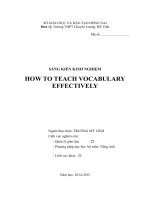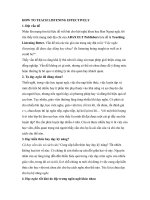How to teach listening potx
Bạn đang xem bản rút gọn của tài liệu. Xem và tải ngay bản đầy đủ của tài liệu tại đây (131.94 KB, 19 trang )
HOW TO TEACH
listening
Why is listening important?
Listening to spoken language helps Ss…
expose to varieties & accents
acquire the language subconsciously
improve listening as a skill
Kinds of listening
1. Listening to authentic materials
to help Ss “get a feel” about the
language
2.Listening to audio tapes/ CDs, videos
to help Ss learn the language
What’s special about listening?
When we read …
•
we can read at our
own pace.
•
we can reread easily.
•
we can use a
dictionary.
When we listen…
•
the speed of the
message depends on
the speaker
•
we can’t listen to the
message again.
•
we can’t look up the
words we don’t know.
Understanding spoken English
Father: How’s your homework? You know,
your history?
Son: Easy.
Father: You sure?
Son: It’s just… I mean all we need to do
is, well, just read some stuff.
Father: But d’you understand it?
Son: Can I go and play with Tom?
Yuko: What would you like your life to be
like in 20 years’ time?
Hiroki: I’d like it to be … I want to have a
family… you know, a husband, three
children, my …
Yuko: Would you be happy?
Hiroki: I’d be … I mean, yes. Yeah, sure,
sure, of course. What about you?
Yuko: Erm, me, well erm, er… Maybe I’d
like to have a good … you know, to
do a really interesting job … with
lots of pay, of course!
What’s special about listening?
1. Spoken language is informal
incomplete utterances
repetition / paraphrasing
hesitation
colloquial style
2. Spoken factors
stress & rhythm
intonation
tone of voice
Listening exercises - Example
Listen to each question and decide if the speaker is
asking about where or when something is happening.
1. When Where
2. When Where
3. When Where
4. When Where
5. When Where
What is the focus of this exercise?
Listening exercises - Example
Listen to part of the lecture about multiple intelligences.
Complete the following passage with the words you hear.
This first one, (1) …………… intelligence is an ability to (2)
…………… languages and the ability to use language effectively
to (3) ………………… and to remember things. In Gardner’s view,
writers, poets, (4)………………., people like that possess a (5)
………………… of linguistic intelligence.
What is the focus of this exercise?
Listening basic subskills
1. Listening for main ideas
2. Listening for specific information
3. Listening for details
4. Intensive listening
5. Extensive listening
Teaching listening -
Principles
1. Tape recorder is as important as the
tape.
T needs to be skillful in using tape recorder.
Good quality of
sound
Teaching listening -
Principles
2. Preparation is vital.
T has to…
listen to the tape in advance
predict any problems Ss may have
think of ways to get ready for them
Teaching listening -
Principles
3. Once will not be enough.
1
st
listening get general comprehension
2
nd
listening listening task 1
3
rd
listening listening task 2
…
Teaching listening -
Principles
4. Encourage Ss to respond to the
content of a listening.
Examples
Example 1
a. Listen & notice the difference in
pronunciation b/w these 2 sentences:
I can meet you on Monday
I can’t meet you on Monday.
b. Listen & circle the word you hear.
1. can can’t 3. can can’t
2. can can’t 4. can can’t
Example 2
•
Listen to Liz talking about what she can do
and can’t do. Complete the chart.
Can Can’t
1. 1.
2. 2.
3. 3.
4. 4.
5. 5.
Teaching listening -
Principles
5. Different listening stages demand
different listening tasks.
Easy Difficult
General Specific
Main ideas details
Teaching listening - Principles
getting
ready
engage
listening
task 1
writing
task(s)
oral
task(s)
…
listening
task 2
TOPIC
6. Exploit listening texts to the full.
The stages of a listening lesson
Before
During
After
•
Lead-in: stimulate learners’ interest;
provide them with ideas
•
Language focus: vocabulary,
pronunciation, connected speech,
language functions
•
Listening task / tasks
•
Transfer and language focus:
correction









